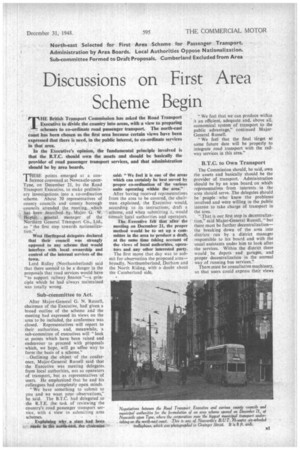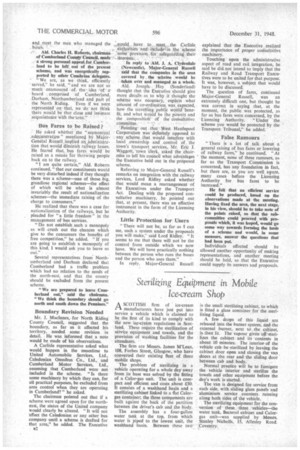North-east Selected for First Area Scheme for Passenger Transport. Administration
Page 35

Page 36

If you've noticed an error in this article please click here to report it so we can fix it.
by Area Boards. Local Authorities Oppose Nationalization. Sub-committee Formed to Draft Proposals. Cumberland Excluded from Area
Discussions on First Area Scheme Begin
HE British Transport Commission has asked the Road Transport Executive to divide the country into areas, with a view to preparing schemes to co-ordinate road passenger transport. The north-east coast has been chosen as the first area because certain views hale been expressed that there is need, in the public interest, to co-ordinate services in that area.
In the Executive's opinion, the fundamental principle involved is that the B.T.C. should own the assets and should be basically the provider of road passenger transport services, and that administration should be by area boards.
THESE points emerged at a con/ ference convened at Newcastle-upon Tyne, on December 21, by the Road Transport Executive, to make preliminary investigations into a co-ordination scheme. About 70 representatives of county councils and county borough councils attended the meeting,. which has been ,described • by. Major G. W.
-. general manager of the Northern General Transport Co., Ltd., as "the first step towards nationalization."
West Hartlepool delegates declared
that their council was strongly opposed to any scheme that would interfere with local ownership and control of the internal services of the town.
Lord Ridley (Northumberland) said that there seemed to be a danger in the proposals that road services would have " to support railway finance "—a principle which he had always maintained was totally wrong.
Sub-committee to Act.
After Major-General G. N. Russell, chairman of the Executive, had given a broad outline of the scheme and the meeting had expressed its views on the area to be included, the conference was closed. Representatives will report to their authorities, and, meanwhile, a sub-committee of executives will "look at points which have been raised and endeavour to proceed with proposals which, we hope, will go sdine way to form the basis of a scheme."
Outlining the object of the conference, Major-General Russell said that the Executive was meeting delegates from local authorities, not as operators of transport, but as representatives of users. He emphasized that he and his colleagues had completely open minds.
"We have something to submit to you and we want your observations," he said. The B.T.C. had delegated to the R.T.E. the task of reviewing the country's road passenger transport service, with a view to submitting area schemes.
. Explaining why, a start had been
• nude in the north-east. the chairman
said: "W feel it is one of the areas which can certainly be best served by proper co-ordination of the various units operating within the area."' After having received representations from the area to be covered, the chair man explained, the Executive would, according to its instructions, draft a scheme, and when submitting it, would consult local authorities and operators.
The Executive felt that after the meeting on December 21, the proper method would be to set up a committee in the area to produce a draft, at the same time taking account of the views of local authorities, operators and any other interested party. The first move that day was to sub mit for observation the proposed area—
broadly, Northumberland, Durham and the North Riding, with a doubt about the Cumberland side. "We feel that we can produce within it an efficient, adequate and, above all, economical system of transport to the public advantage," continued MajorGeneral Russell.
"We feel that the final target at some future date will be properly to integrate road transport with the railway services in this area."
B.T.C. to Own Transport
The Commission should, he said, own the assets and basically should be the provider of transport. Administration should be by an area board on whiCh representatives from interests in the area should serve. .The delegates should be people who knew the problems involved and were willing in the public interest to take charge of transport in the area.
" That is our first step in decentralization," said Major-General Russell, "but there must be further decentralization— the breaking down of the area into districts run by a district manager responsible to his board and with the usual assistants under him to look after the services. Within the district there would . be depots and garages, and proper decentralization in the normal way of running bus services." There must be consultative machinery, so that users could express their views
and meet the men who managed the .buseS.
Aid. Charles H. Roberts, chairman of -Cumberland County Council, made
• a strong personal appeal for Cumberland to be left out of the present • scheme, and was energetically supported by other Cumbrian delegates. "We are, as we think, efficiently
• served," he said, "and we are not so much • enamoured of. the idea 'of a: board comprised of Cumberland, Durham, Northumberland and part of the North Riding. Even if we were represented on that we do not think tnere would be that close and int•itnate acquaintance with the-area."
Bus Fares to be. Raised ?
He asked whether the "economical ,administration" mentioned bY MajorGeneial Russell implied art_aclministration that would diminish railway losses. He feared that. bus fares would be raised as a means for throwing people back on to the railway.
"I am quite certain," Ald. Roberts continued, "that our constituents would be very disturbed indeed if they thought there was a scheme—one of those big, grandiose regional schemes—the effect of which will be what is almost invariably the result of nationalization schemes—the immediate raising of the charge to consumers."
He realized that there was a case for nationalization of the railways, but he pleaded for "a little freedom" in the management of bus services.
"Do not establish such a monopoly as will crush out the chances which give to the consumers the benefits of free competition," he added. "If you are going to establish a monopoly of this kind. I would ask you to leave us out."
Several representatives from Northumberland and Durham declared that Cumberland had a traffic problem which had no relation to the needs of the north-east, and that the county should be excluded from the present scheme.
"We are prepared to leave Cumberland out," said the chairman. "We think the boundary should go north and south down the Pennines."
Boundary Revision Needed
Mr_ J. Macinnes, for North Riding County Council, suggested that the boundary, as far as it affected his territory, needed some revision in detail. He was informed that a note would be made of his observations.
A Carlisle representative asked what would happen in the meantime to United Automobile Services, Ltd., Caledonian Omnibus Co., Ltd., and Cumberland Motor Services, Ltd., assuming that Cumberland were not included in the scheme. "Is there some machinery by which they can, for all practical purposes, be excluded from area control when they are operating in Cumberland?" he asked.
The chairman pointed out that if a scheme were agreed upon for the northeast, the status of the United company would clearly be altered. "It will not affect the Caledonian or any other bus company until a scheme is drafted for that area," he added. The Executive
B2 .,..wciuld have to meet the Carlisle
,ftiithafities and include, in the scheme
some provision for safeguarding their 'interests. .
In reply to ,Aid. J. A. Clydesdale
(Newcastle), Major-General Russell said that the companies in the area covered by the scheme would be taken over and managed as a whole. Ald. Joseph Hoy (Sunderland)
thought that the Executive should give more details as to why it thought the scheme was necessary, explain what anunint of co-ordination was expected, how the travelling public would benefit, and what would be the powers and the composition of the consultative committee.
'Pointingout that West Hartlepool Corporation was definitely opposed to any scheme that would interfere with local ownership and control of the town's transport services,. Mr. Eric J. Waggott, town clerk, asked the chairman to tell his council what advantages the Executive held out in the proposed scheme.
Referring to Major-General Russell's remarks on integration with the railway services, Lord Ridley asked whether that would mean a rearrangement of the Executives under the Transport Act. Dealing with the proposed consultative machinery, he pointed out that, at present, there was an effective instrument in the form of the Licensing Authority.
Little Protection for Users
"There will not be, as far as I can see, such a system under the proposals you will make," said Lord Ridley. "It seems to me that there will not be the control from outside which we now have. We will have practically nothing between the person who runs the buses and the person who uses them."
In reply, Major-General Russell explained that the Executive realized the importance of proper consultative machinery.
Touching upon the administrative aspect of road and rail integration, he said he did, not intend to imply that the Railway and Road Transport Executives were to be united for that purpose. It was, however, a subject that would have to be discussed.
The question of fares, continued Major-General Russell, was an extremely difficult one, but thought he was correct in saying that, at the moment, the public was protected, as far as bus fares were concerned, by the Licensing Authority. "Under the scheme you would be protected by the Transport Tribunal," he added.
False Rumours
"There is a lot of talk about a general raising of bus fares or lowering of railway fares," he continued. "At the moment, none of these rumours, as far as the Transport Commission is concerned, has any foundation in fact, but there are, as you are well aware, many cases before the Licensing Authority for bus fares to be increased."
He felt that an efficient service could be produced, based on the observations made at the meeting. Having fixed the area, the next stage, in his view, should be to take note of the points raised, so that the subcommittee could proceed with proposals which, it was hoped, would go some way towards forming the basis of a scheme and would, in some measure, answer the questions that had been put.
Individuals affected should be allowed another opportunity of making representations, and another meeting should be held, so that the Executive could supply its answers and proposals.




























































































